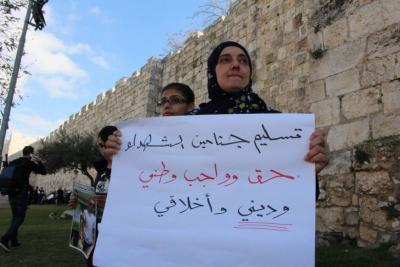
Israeli High Court Postpones Decision on Setting Date for Returning of Bodies of Extrajudicially Executed Palestinians
Ramallah - The Israeli High Court decided to postpone looking into the petition filed by Addameer attorney Adv. Mohammad Mahmoud regarding setting a date for returning the bodies of Palestinians who were extrajudicially executed to their families.
The judges stated that the hearing will be postponed until the end of the Jewish holidays and that the return of the bodies will be subject to extreme security measures. However, the prosecution did not provide the court with the details of the before mentioned security measures. The occupation authorities have returned most of the bodies of Palestinians who were extrajudicially executed in recent months to the families. However, they continue to hold a number of the bodies despite the fact that some of the families agreed to the extremely harsh and arbitrary conditions.
Addameer considers the decision to keep the bodies of 15 Palestinians who were extrajudicially executed by Israeli forces and police for more than six months an extremely humiliating practice and one degrading to the human dignity of the deceased, family members and to the cultural and religious norms of Palestinian society. Addameer stresses that this practice constitutes collective punishment that targets the families of the deceased and aims to obstruct any attempts to investigate the extrajudicial executions.
The occupation authorities continue to withhold the bodies of 15 Palestinians who were killed during the recent uprising that started in the beginning of October 2015. The names of the extrajudicially executed Palestinians that are still being held by the occupation authorities are: Thaer Abdul Salam Abu Ghazaleh (whose body has been withheld the longest period), Hasan Khalid Jibril Manasra, Mohammad Khalil Olayyan, Alaa Dauod Abu Jamal, Mutaz Oweisat, Mohhamd Ali Nimer, Abdul Mohsen Shaher Hassouneh, Mohmmad Abu Khalaf, Fadwa Abu Teir, Bashar Masalha, Fuad Abu Rajab, Abdul Rahman Raddad, Abdul Malek Abu Kharoub, Mohammad Kaloti, and Abdul Fatah Sharif.